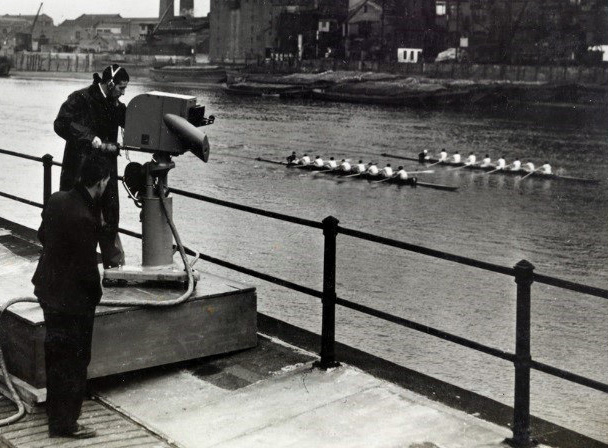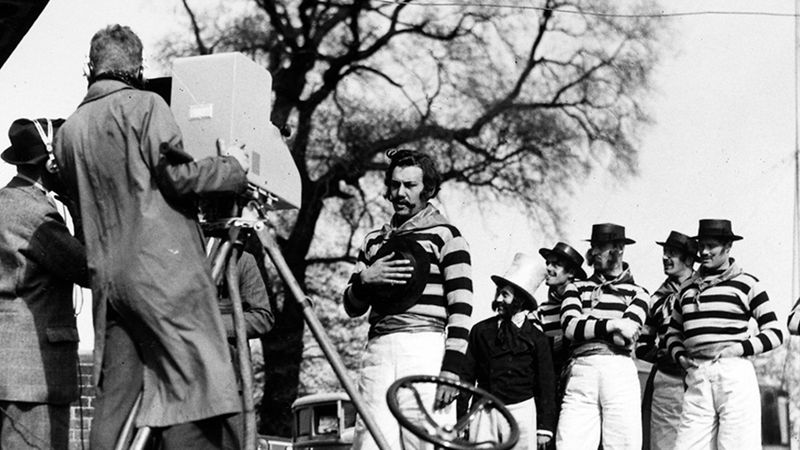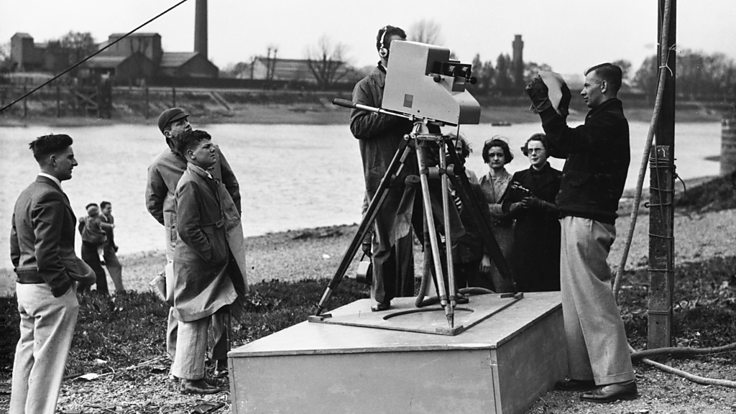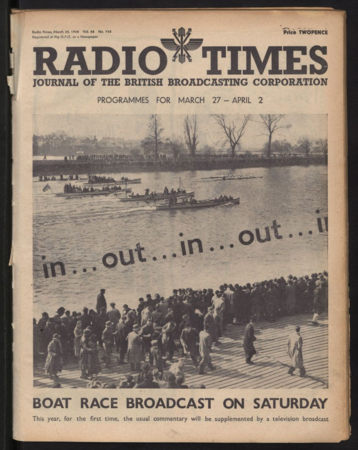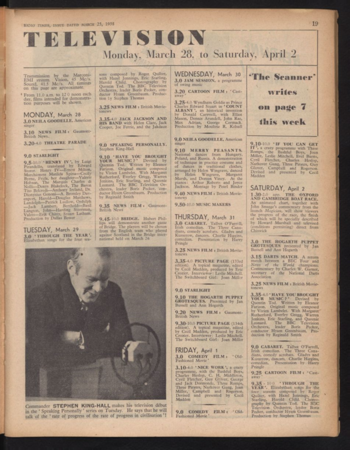The Boat Race 1938 (partially found footage of rowing race; 1938): Difference between revisions
mNo edit summary |
No edit summary |
||
| Line 5: | Line 5: | ||
|status=<span style="color:orange;">'''Partially Found'''</span> | |status=<span style="color:orange;">'''Partially Found'''</span> | ||
}} | }} | ||
On 2nd April 1938, the '''''90th Boat Race''''' commenced. Pitting crews from the University of Oxford and Cambridge in a rowing race along the River Thames, this event was the first ever televised Boat Race, a trend that continues to the present day. | On 2nd April 1938, the '''''90th Boat Race''''' commenced. Pitting crews from the University of Oxford and Cambridge in a rowing race along the River Thames, this event was the first-ever televised Boat Race, a trend that continues to the present day. | ||
==Background== | ==Background== | ||
| Line 12: | Line 12: | ||
Meanwhile, the BBC were seeking to televise various sports, including rugby, football and test cricket, for its relatively new Television Service.<ref>[https://www.swlondoner.co.uk/sport/19032021-rugby-tv-debut-calcutta-cup-televised-83-years-on/#:~:text=On%20March%2019th%201938%2C%2083,Toft's%20English%20side%2021%2D16. ''SW Londoner'' article discussing the BBC's efforts to televise sports, including The Boat Race.] Retrieved 10 May '21</ref> Among them was the 90th Boat Race, the BBC having already succeeded in covering the Boat Race via radio since 1927. The BBC had previously broadcast a programme for the 89th Boat Race, but this featured no footage of the race. Rather, discussion from John Snagge and Tom Brocklebank, as well as film extracts of previous races and models showing where the competitors were, dominated the television screen.<ref>[https://genome.ch.bbc.co.uk/search/0/20?order=asc&q=boat+race&svc=9371533#search BBC Genome archive of ''Radio Times'' issues, listing the 1937 and 1938 Boat Race television coverage, and ''Rowing Blues''.] Retrieved 10 May '21</ref><ref>[https://genome.ch.bbc.co.uk/page/98b374495385473badb46953eb8b6696 Issue 703 of ''Radio Times'', listing the 1937 Boat Race.] Retrieved 10 May '21</ref> The BBC's subsequent broadcast of the Boat Race would feature live footage, including seeing the competitors cross the line.<ref>[https://genome.ch.bbc.co.uk/page/17e89bc6bf504532aa12cc89760f8e79 Issue 756 of ''Radio Times'', listing the coverage of the 1938 Boat Race.] Retrieved 10 May '21</ref> | Meanwhile, the BBC were seeking to televise various sports, including rugby, football and test cricket, for its relatively new Television Service.<ref>[https://www.swlondoner.co.uk/sport/19032021-rugby-tv-debut-calcutta-cup-televised-83-years-on/#:~:text=On%20March%2019th%201938%2C%2083,Toft's%20English%20side%2021%2D16. ''SW Londoner'' article discussing the BBC's efforts to televise sports, including The Boat Race.] Retrieved 10 May '21</ref> Among them was the 90th Boat Race, the BBC having already succeeded in covering the Boat Race via radio since 1927. The BBC had previously broadcast a programme for the 89th Boat Race, but this featured no footage of the race. Rather, discussion from John Snagge and Tom Brocklebank, as well as film extracts of previous races and models showing where the competitors were, dominated the television screen.<ref>[https://genome.ch.bbc.co.uk/search/0/20?order=asc&q=boat+race&svc=9371533#search BBC Genome archive of ''Radio Times'' issues, listing the 1937 and 1938 Boat Race television coverage, and ''Rowing Blues''.] Retrieved 10 May '21</ref><ref>[https://genome.ch.bbc.co.uk/page/98b374495385473badb46953eb8b6696 Issue 703 of ''Radio Times'', listing the 1937 Boat Race.] Retrieved 10 May '21</ref> The BBC's subsequent broadcast of the Boat Race would feature live footage, including seeing the competitors cross the line.<ref>[https://genome.ch.bbc.co.uk/page/17e89bc6bf504532aa12cc89760f8e79 Issue 756 of ''Radio Times'', listing the coverage of the 1938 Boat Race.] Retrieved 10 May '21</ref> | ||
Financial and technical limitations meant that coverage was limited. Particularly, cameras were only situated at the finish line at Chiswick Bridge, and the | Financial and technical limitations meant that coverage was limited. Particularly, cameras were only situated at the finish line at Chiswick Bridge, and the boathouse. Additionally, the commentary was provided by Snagge, who also did radio coverage simultaneously, and race progress was covered through a chart.<ref>[https://www.bbc.com/historyofthebbc/anniversaries/april/boat-race-first-televised ''History of the BBC'' anniversary documenting the first televised Boat Race, and the broadcast limitations.] Retrieved 10 May '21</ref> Nevertheless, the broadcast was deemed a major success. Indeed, the television correspondent for ''The Observer'' stated it was so successful and informative that even the viewers knew more about the race than the umpire. Oxford went on to win by a margin of 2 lengths. The day after the race, the BBC broadcast a programme called ''Rowing Blues'', where Philip Dorte would review the races from 1929 to 1938.<ref>[https://genome.ch.bbc.co.uk/page/0732678f1531430d950fb2cf2ebad85f Issue 757 of ''Radio Times'', listing ''Rowing Blues''.] Retrieved 10 May '21</ref> | ||
==Availability== | ==Availability== | ||
| Line 23: | Line 23: | ||
|description1 =Footage of the event from ''British Pathé.'' | |description1 =Footage of the event from ''British Pathé.'' | ||
}} | }} | ||
<gallery mode=packed heights=300px> | <gallery mode=packed heights=300px> | ||
File:Theboatrace19382.jpg|The Oxford crew posing for the camera. | File:Theboatrace19382.jpg|The Oxford crew posing for the camera. | ||
| Line 30: | Line 29: | ||
File:Theboatrace19385.png|Same ''Radio Times'' issue listing the event. | File:Theboatrace19385.png|Same ''Radio Times'' issue listing the event. | ||
</gallery> | </gallery> | ||
==References== | ==References== | ||
{{reflist}} | {{reflist}} | ||
Revision as of 03:08, 11 May 2021
On 2nd April 1938, the 90th Boat Race commenced. Pitting crews from the University of Oxford and Cambridge in a rowing race along the River Thames, this event was the first-ever televised Boat Race, a trend that continues to the present day.
Background
The Boat Race is a rowing event first established in 1829, eventually becoming an annual event being held on the River Thames between Oxford and Cambridge University since 1856.[1] It is a type of side-by-side rowing competition, whereby crews start concurrently at the same position.[2] By the time The Boat Race 1938 commenced, Cambridge had won 47 races to Oxford's 41. However, Oxford were the defending champions, having won the 1937 event.[3] Oxford were also deemed the favourites heading into the event.[4]
Meanwhile, the BBC were seeking to televise various sports, including rugby, football and test cricket, for its relatively new Television Service.[5] Among them was the 90th Boat Race, the BBC having already succeeded in covering the Boat Race via radio since 1927. The BBC had previously broadcast a programme for the 89th Boat Race, but this featured no footage of the race. Rather, discussion from John Snagge and Tom Brocklebank, as well as film extracts of previous races and models showing where the competitors were, dominated the television screen.[6][7] The BBC's subsequent broadcast of the Boat Race would feature live footage, including seeing the competitors cross the line.[8]
Financial and technical limitations meant that coverage was limited. Particularly, cameras were only situated at the finish line at Chiswick Bridge, and the boathouse. Additionally, the commentary was provided by Snagge, who also did radio coverage simultaneously, and race progress was covered through a chart.[9] Nevertheless, the broadcast was deemed a major success. Indeed, the television correspondent for The Observer stated it was so successful and informative that even the viewers knew more about the race than the umpire. Oxford went on to win by a margin of 2 lengths. The day after the race, the BBC broadcast a programme called Rowing Blues, where Philip Dorte would review the races from 1929 to 1938.[10]
Availability
Like other early BBC television broadcasts, the 90th Boat Race was broadcast live and was not recorded. Therefore, televised footage of the event is now permanently missing. Photos of the BBC camera pointing towards the boats, and the Oxford crew posing for the camera, are all that remains of the broadcast. Nevertheless, the race itself is not fully lost, with a British Pathé recording providing a few minutes of footage that is publicly accessible. All footage of the 1937 broadcast, and Rowing Blues, are also lost forever.
Gallery
References
- ↑ Telegraph article discussing brief history of The Boat Race. Retrieved 10 May '21
- ↑ British Rowing defining side-by-side rowing. Retrieved 10 May '21
- ↑ Official Boat Race website, listing all Boat Race results. Retrieved 10 May '21
- ↑ 3rd April 1938 issue of The Observer, discussing Oxford's win, its status as the favourite to win, and deeming the television coverage as a success. Retrieved 10 May '21
- ↑ SW Londoner article discussing the BBC's efforts to televise sports, including The Boat Race. Retrieved 10 May '21
- ↑ BBC Genome archive of Radio Times issues, listing the 1937 and 1938 Boat Race television coverage, and Rowing Blues. Retrieved 10 May '21
- ↑ Issue 703 of Radio Times, listing the 1937 Boat Race. Retrieved 10 May '21
- ↑ Issue 756 of Radio Times, listing the coverage of the 1938 Boat Race. Retrieved 10 May '21
- ↑ History of the BBC anniversary documenting the first televised Boat Race, and the broadcast limitations. Retrieved 10 May '21
- ↑ Issue 757 of Radio Times, listing Rowing Blues. Retrieved 10 May '21
